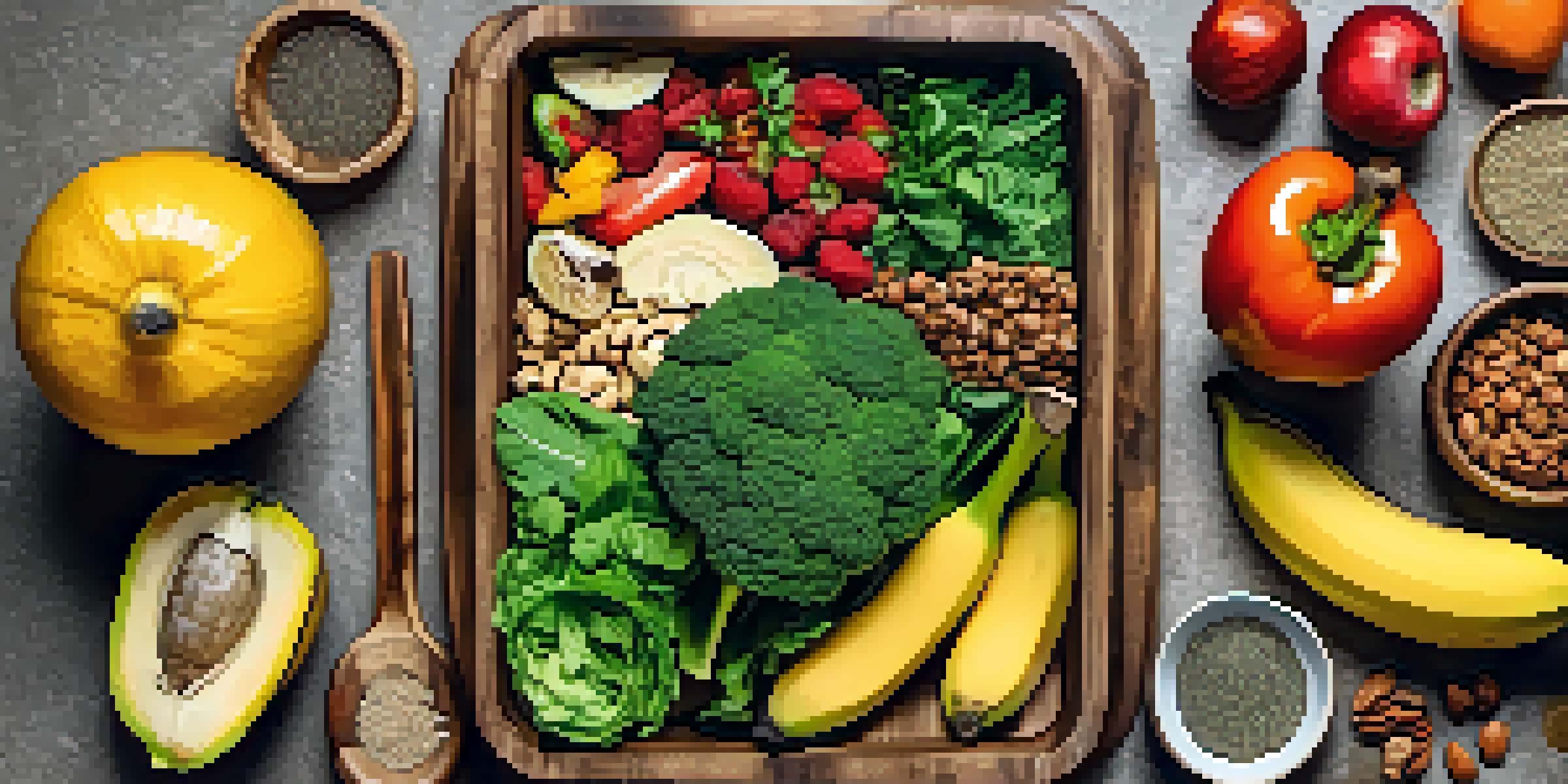The Connection Between Vegan Diets and PMS Relief

Understanding PMS: Symptoms and Causes
Premenstrual syndrome, or PMS, affects many women and manifests through symptoms like mood swings, bloating, and cramps. These symptoms typically arise in the luteal phase of the menstrual cycle, which occurs after ovulation and before menstruation. Factors contributing to PMS can include hormonal imbalances, lifestyle choices, and diet, making it essential to explore various ways to find relief.
The food you eat can be either the safest and most powerful form of medicine or the slowest form of poison.
For instance, hormonal fluctuations can lead to physical and emotional symptoms that may disrupt daily life. Understanding these changes is crucial for managing PMS effectively. One area gaining attention is the impact of diet on symptoms, especially in relation to plant-based eating.
As women seek natural methods to alleviate their PMS symptoms, the connection between diet and hormonal health becomes increasingly relevant. This is where vegan diets come into play, offering potential benefits that are worth exploring.
How Vegan Diets Influence Hormonal Balance
A vegan diet is primarily composed of plant-based foods, which are rich in nutrients that can help regulate hormones. These diets are often high in fiber, antioxidants, and phytonutrients, all of which can play a role in supporting hormonal balance. For example, fiber helps to eliminate excess estrogen, which may alleviate some PMS symptoms.

Additionally, plant-based diets are typically lower in saturated fats and higher in healthy fats from sources like avocados, nuts, and seeds. This shift can improve overall hormonal health, making it easier for the body to maintain balance during the menstrual cycle. Furthermore, certain foods, like flaxseeds, contain lignans that may help modulate estrogen levels.
PMS Symptoms Linked to Hormones
Premenstrual syndrome (PMS) is influenced by hormonal changes, lifestyle choices, and diet.
By focusing on whole, unprocessed foods, those following a vegan diet can create a nutrient-dense lifestyle that supports their hormonal health. This may be particularly beneficial for women experiencing PMS, as a balanced diet can lead to more stable hormone levels.
Nutrient-Rich Foods for PMS Relief
Certain vegan foods are especially beneficial for easing PMS symptoms. Leafy greens, for instance, are packed with magnesium, a mineral known to help reduce bloating and mood swings. Incorporating foods like spinach and kale can provide valuable nutrients that may alleviate discomfort during the menstrual cycle.
Let food be thy medicine and medicine be thy food.
Another group of foods to consider is those rich in omega-3 fatty acids, such as chia seeds and walnuts. Omega-3s have anti-inflammatory properties that can help reduce cramps and improve mood. Including these foods can make a significant difference in managing PMS symptoms.
Moreover, foods high in vitamin B6, such as bananas and chickpeas, can also support hormonal balance. B6 is known to help with mood regulation and may reduce irritability linked to PMS. By thoughtfully selecting nutrient-rich foods, women can enhance their diet and potentially find relief from PMS.
The Role of Hydration in PMS Management
Staying hydrated is essential for overall health, but it can be particularly important for managing PMS symptoms. Dehydration can exacerbate bloating and fatigue, making it crucial to drink ample water throughout the menstrual cycle. A vegan diet naturally includes hydrating foods like fruits and vegetables, which can aid in maintaining hydration levels.
Incorporating herbal teas, such as chamomile or ginger tea, can also promote hydration while offering soothing properties. These teas can help ease cramps and calm the mind, providing a comforting ritual during the often-challenging PMS phase. Staying mindful of fluid intake can make a noticeable difference in how one feels.
Vegan Diets Support Hormonal Balance
A vegan diet, rich in nutrients and fiber, can help regulate hormones and alleviate PMS symptoms.
Overall, hydration should be a key component of any diet, especially for those dealing with PMS. By emphasizing liquid intake and consuming hydrating foods, women can support their bodies in coping with the symptoms of PMS.
The Impact of Stress on PMS Symptoms
Stress can significantly influence PMS symptoms, often intensifying feelings of anxiety and irritability. A vegan diet, rich in whole foods and antioxidants, can help combat stress by supporting brain health and mood regulation. Foods like berries and dark chocolate are not only delicious but also packed with nutrients that can elevate mood.
Practicing mindfulness and incorporating stress-reducing activities, such as yoga or meditation, can also enhance the benefits of a vegan diet. These practices can help balance the mind and body, making it easier to cope with PMS symptoms. By addressing both dietary and lifestyle factors, women can create a holistic approach to managing their health.
In essence, understanding the relationship between stress, diet, and PMS is vital for effective management. A vegan diet, combined with stress-reducing techniques, can form a powerful strategy for alleviating symptoms.
Potential Downsides to Consider
While a vegan diet has many benefits, it’s important to be aware of potential downsides that could impact PMS management. For instance, if not well-planned, a vegan diet may lack essential nutrients such as iron and vitamin B12. Deficiencies in these nutrients can lead to fatigue, which may worsen PMS symptoms.
Additionally, some women may find that certain vegan foods, like soy products, can exacerbate hormonal imbalances if consumed in excess. It’s crucial to monitor how specific foods affect individual symptoms, as everyone's body reacts differently. Keeping a food diary can help identify potential triggers.
Hydration and Stress Matter
Staying hydrated and managing stress through diet and mindfulness can significantly improve PMS management.
Ultimately, balance is key. While embracing a vegan lifestyle can offer numerous health benefits, women should ensure they are meeting their nutritional needs to support their overall well-being and PMS management.
Consulting with Professionals for Personalized Guidance
When considering dietary changes, especially for managing PMS symptoms, consulting a healthcare professional is advisable. A registered dietitian or nutritionist can provide personalized guidance and help create a balanced vegan meal plan. This ensures that nutritional needs are met while targeting specific PMS symptoms.
Professional advice can also help identify any potential food sensitivities or allergies that may be contributing to discomfort. By working with an expert, women can tailor their diets to suit their unique bodies and needs. This personalized approach can lead to more effective management of PMS.

In summary, while exploring a vegan diet for PMS relief can be promising, professional support can enhance the experience. This collaboration can empower women to take charge of their health and find relief from PMS symptoms in a holistic manner.